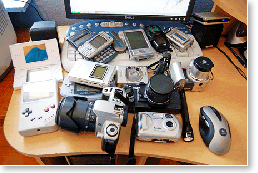Recently, much has been written about our new “plugged-in” society. A recent feature story in the New York Times highlighted the potential dangers to healthy brain functioning that can result from the incessant use of our modern digital communication devices.
 So many of us are attached to our personal computers, iPads, and smart phones. Information is there with a few taps on a keyboard, and we avail ourselves of pounding news and flashing graphics and audiovisual entertainment for an ever-increasing portion of our waking hours. We gobble up this onslaught of sensory information, crave more, and end up processing more by multitasking. We are in fact encouraged to scatter our attention in a multitude of directions at one time by marketers who understand our insatiable craving for MORE! It is unusual to look at a television program or a page on the Internet without encountering several independent messages vying for our attention. On television, there is the station logo in the corner of the screen, pop-up ads on the bottom of the screen featuring upcoming shows on the same network, and of course, the ubiquitous “crawlers.” Even when we’re being told about one BIG NEWS STORY, there is a constant stream of information tucked at the bottom of the screen with literally scores of other news stories.
So many of us are attached to our personal computers, iPads, and smart phones. Information is there with a few taps on a keyboard, and we avail ourselves of pounding news and flashing graphics and audiovisual entertainment for an ever-increasing portion of our waking hours. We gobble up this onslaught of sensory information, crave more, and end up processing more by multitasking. We are in fact encouraged to scatter our attention in a multitude of directions at one time by marketers who understand our insatiable craving for MORE! It is unusual to look at a television program or a page on the Internet without encountering several independent messages vying for our attention. On television, there is the station logo in the corner of the screen, pop-up ads on the bottom of the screen featuring upcoming shows on the same network, and of course, the ubiquitous “crawlers.” Even when we’re being told about one BIG NEWS STORY, there is a constant stream of information tucked at the bottom of the screen with literally scores of other news stories.
 We feel compelled to take it all in, because somehow we equate more sensory experience with the chance for a more fulfilling experience, as if armed with the knowledge of so many details of the world, we could somehow gain mastery over it.
We feel compelled to take it all in, because somehow we equate more sensory experience with the chance for a more fulfilling experience, as if armed with the knowledge of so many details of the world, we could somehow gain mastery over it.
Of course, when you stop and think about it, you just know that will never happen. The details are never-ending. The ability to process them in time is limited. Moreover, when you think of which experiences have been most fulfilling, you think of those singular experiences that captured your mind and emotions without distraction. At those rare moments, your mind is not being pulled in a million directions. Rather, you are absorbed on a deeper, more powerful level of thought and emotion.
This is what psychologists refer to as a peak experience, when the chatter of the surface level of thought melts away, and the experience is deep and rich, even blissful. Such an experience has more of the quality of the transcendent field underlying all thoughts. There is a profound simplicity to it. It is the experience of unity amidst diversity.
The fact is, if you want to culture peak experiences so that they become everyday experiences, you need to do more than unplug and take a break from multitasking. You need to infuse that transcendent field into your daily activity. If you use your downtime to regularly transcend, plugging in again will be that much more blissful. You need to meditate.
___________________________________________________________________________
Dr. Gary Kaplan is a neurologist and Associate Professor of Clinical Neurology at Hofstra University School of Medicine. Dr. Kaplan was formerly Director of Neurophysiology at North Shore University Hospital and is now in private practice in clinical neurology in New Hyde Park.
Web references:
Transcendental Meditation Helps Young Adults Cope With Stress



